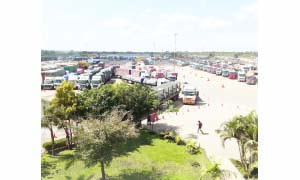By Kennedy Mupeseni
AS the third wave of the Coronavirus (COVID-19) pandemic wreaks havoc on African economies including Zambia, measures to encourage trade should be on top of the continent’s agenda.
It is worth mentioning that as African nations implement health protocols with regard to COVID-19 pandemic, countries should minimise trade barriers to encourage the flow of businesses within the region.
With the recent happenings at Kasumbalesa border on the Copperbelt, business came to a standstill as truck drivers refused to enter the Democratic Republic of Congo (DRC) due to trade restrictions such as COVID-19 certification and payment of US$45 fee.
The truck drivers had requested the Zambian and DRC’s governments to resolve the matter, where DRC was demanding a US$45 payment and COVID-19 certificate fee from the transporters as a health precaution measure.
This however slowed down the movement of goods from entering into the DRC.
Southern African Development Community (SADC) Drivers Association president Eugene Ndhlovu regrets the incident, and despite bringing the issue to the attention of the two Governments nothing has been done.
“We are dismayed by Congolese disregard for the SADC health protocols which states that a person with COVID-19 certification from another country can enter another country because the certification is recognised by the World Health Organisation (WHO),” he says
Mr Ndhlovu says the major issue is not about finding it difficult to pay US$45 swabbing and certification fee but the number of times members can be swabbed.
“Undergoing COVID-19 testing is tedious, some truck drivers depending on the schedule can enter Congo five times a week and subjecting them to testing from both Zambia and DRC is being unfair to truck drivers,” he adds.
The Association appreciated the challenges countries are facing in containing the pandemic but that subjecting people with varied certification is being unfair.
Mr Ndhlovu laments that while the Zambian authorities are allowing those with varied certification from DRC to enter the country, the Congolese authorities do not want to reciprocate.
“In this case our hands are tied, there is nothing we can do to persuade our members to enter that country (DRC) because we have tried to engage authorities to no avail,” he says.
Commenting on the issues raised by the truck drivers, Transport and Communications permanent secretary Misheck Lungu assures that the Zambian Government is engaging its Congolese counterpart to see to it that they moderate the action.
Mr Lungu says the two countries belong to the SADC region and have protocols which both have agreed to implement, therefore in order to improve the flow of business, it is important that the situation is harmonised.
“The situation in DRC is very unfortunate and as a Government we are engaging our Congolese counterparts through so that we harmonise the situation for the smooth flow of business,” he explains.
After the Zambian Government intervention and persuasions, truck drivers using Kasumbalesa border who parked their trucks protesting DRC’s health authorities’ insistence on COVID-19 certification payment of US$45; they reluctantly agreed to rescind their protest.
Copperbelt permanent secretary Bright Nundwe says the matter had been resolved and agreed upon that the drivers will now pay US$10 as opposed to the US$45 which was earlier being requested for.
Mr Nundwe advised the drivers not to engage in any riots but continue to seek their demands in a peaceful manner.
“Yes I am aware of the happenings in Kasumbalesa where our drivers are being asked to pay US$45 as COVID-19 certification, however we have resolved the issue with our counterparts and agree that they pay US$10, they have since started entering DRC,” he states.
And Mike Saidi, a truck driver, says the drivers reluctantly agreed to proceed to the DRC and wants the two countries to resolve the impasse within a week.
“We have reluctantly agreed to cross to the DRC, we want this issue to be resolved, our issue is not necessarily the US$45 being imposed by the DRC but the propensity by the Congolese authorities to swab drivers with COVID-19 certification from Zambia, as I am speaking the border is closed, but we shall start going in based on the assurance,” Mr Saidi says.
He says the truck drivers want the issue resolved for smooth operations at the border adding that there was need for the Congolese authorities to adhere to the SADC health protocols.
A convoy of trucks is almost reaching Chililabombwe business district due to business disruptions at the border.
Kasumbalesa is one of the most strategic border posts as it facilitates the movement of goods for the region and any business disruption has telling effects on regional trade.
Recently during the Zambia Revenue Authority (ZRA) board members tour of the border facilities, it was disclosed that the Authority collected K16.5 million in revenue between January and May which is about 38.2 per cent of the set target for this year.
This show how important Kasumbalesa is to the country’s economic well being.
ZRA board chairman Bwalya Chiti called for a need to improve exports of Zambian goods to neighbouring countries and that can only be done if there is smooth border facilitation.
The DRC has a huge market that Zambians should exploit and that once there is an increase in the export of local products, the country will earn a lot of foreign exchange and also improve its reserves.
As the African Continental Free Trade Area (AfCFTA) gets on top gear, there is need for participating countries to work on removing barriers to trade for a win-win situation.







